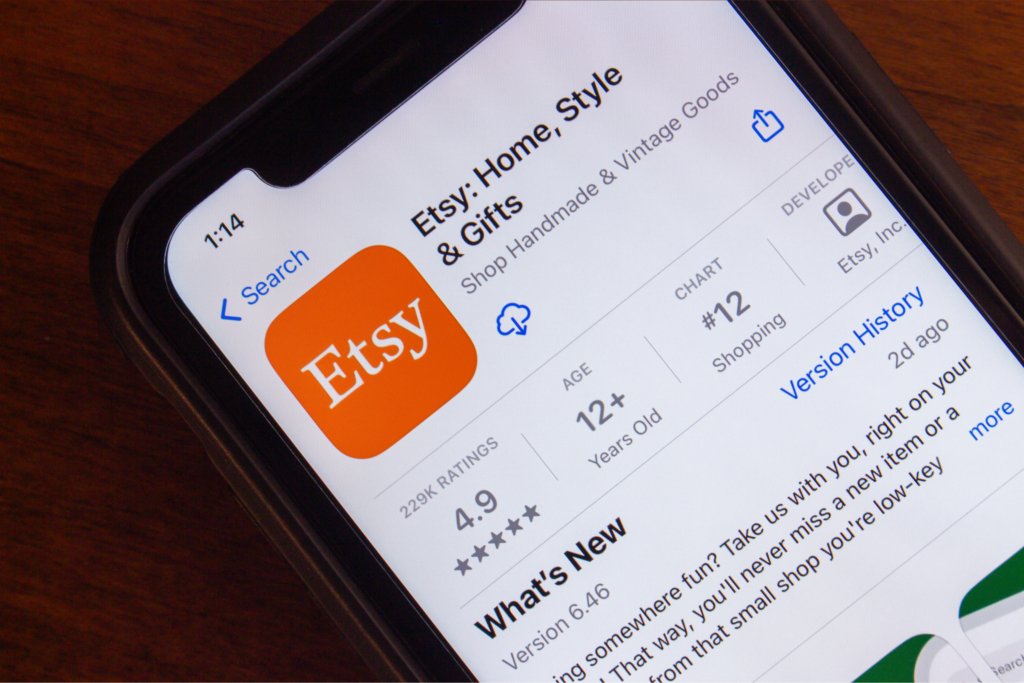Sell custom products with Printify
Wix is one of the most popular website builders, but you may want to explore other options. Whether you need different eCommerce tools, more design flexibility, or lower pricing, checking out Wix alternatives will help you find the best home for your online store.
This article explores the nine best Wix alternatives for 2026. We’ll break down each platform’s key features, pros, and cons, helping you decide which website builder suits your goals – whether you’re creating an online store, a portfolio, or a business website.
This post may contain affiliate links, which means we may earn a commission if you make a purchase through those links. This comes at no additional cost to you.
Key takeaways
- The best Wix alternative depends on your goals – Shopify is great for online stores, Squarespace shines for design, and WordPress gives you total customization.
- Pricing varies. Webnode ($4.50/month) and Hostinger Website Builder ($2.99/month) are budget-friendly, while Shopify ($29/month) and Duda ($14/month) offer premium features.
- Some platforms are easier to use. Weebly and GoDaddy Website Builder are great for beginners, while creating a Webflow or WordPress site offers more control but has a learning curve.
- Not all builders support eCommerce. Shopify is the best for online selling, while Weebly, Webnode, and GoDaddy offer basic store features. Carrd does not have eCommerce support.
- Shopify and Duda are great for scaling businesses, while Webnode works better for basic sites and portfolios.
What to look for in a Wix alternative

Keep these key factors in mind when looking for the best Wix alternative:
- Ease of use – A user-friendly interface is a must, especially for beginners. Look for a builder with a simple drag-and-drop website editor.
- Pricing – Check out free plans and consider the costs for monthly and yearly payments, plus any extra fees for transactions or renewals. Some platforms throw in a free domain, while others might ask you to pay for hosting separately. Hosting providers usually offer great deals in the first year, but be aware the prices can go up after that.
- Design flexibility – Platforms with professionally designed templates, dynamic styling features, and drag-and-drop builders give you more creative freedom.
- Scalability – Your website builder should support future growth by offering advanced tools and marketing features.
- eCommerce tools – If you’re building an online store, look for solutions with dedicated inventory management tools, eCommerce, and marketing features.
- Built-in SEO tools – These tools can improve your brand’s visibility online and lead to increased sales.
- Customer support – If you’re a beginner, choose a platform with strong support and learning resources.
- Integrations – Your website builder must work with third-party apps like payment gateways, logo-maker tools, and social media platforms.
Once you’ve explored the top Wix alternatives, learn more about Wix website design on our blog.
Top 9 Wix alternatives
Now that you know what to look for in a good Wix alternative, we’ve rounded up the best options for you to check out. We’ll go over their key features, pricing, pros, and cons to help you choose the right website builder without the guesswork.
1. Shopify
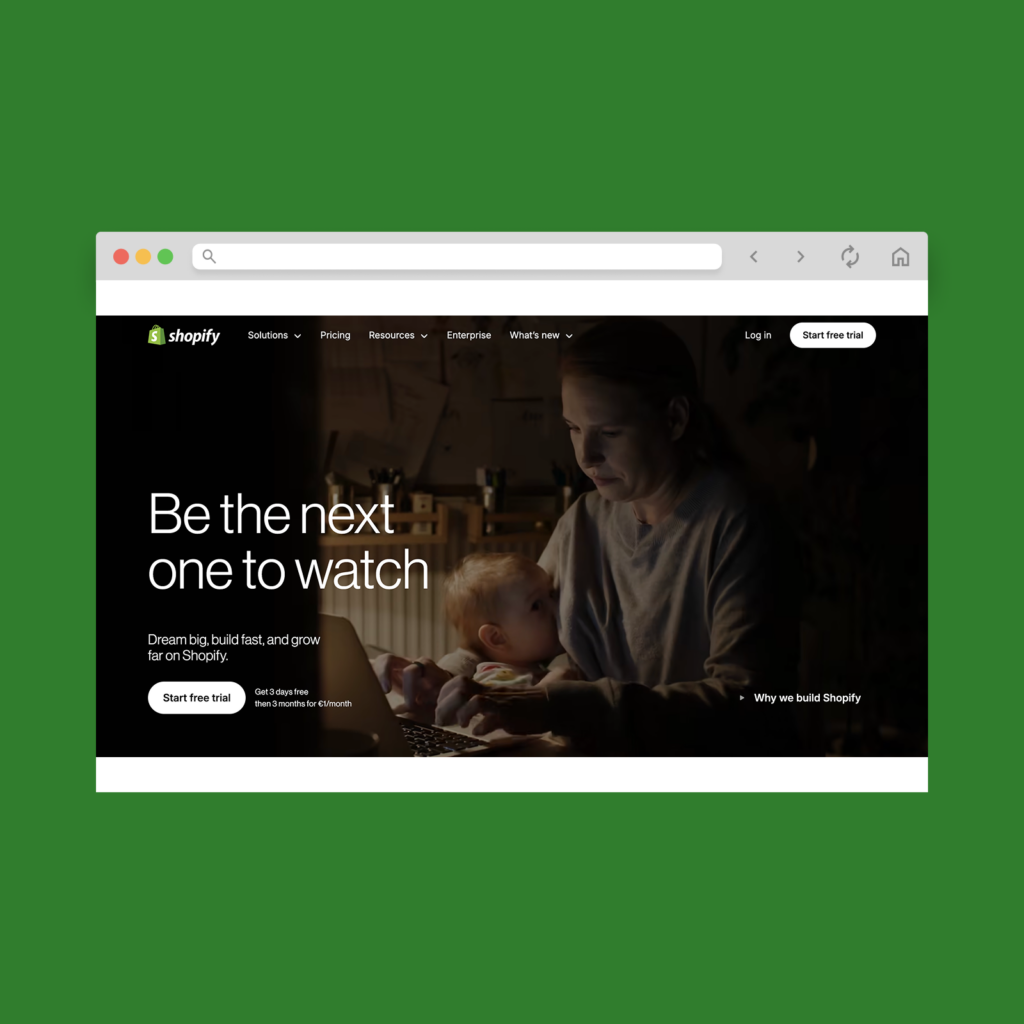
Shopify is one of the top Wix alternatives if you’re looking to build a powerful online store. It provides everything you need to sell products online, from website templates to secure checkout and inventory management.
Key features:
- An intuitive interface and drag-and-drop editor simplify the website-building process.
- Over 70 professionally-looking templates for many industries.
- Useful eCommerce tools, including inventory management, secure payment gateways, and shipping integrations.
- Built-in Search Engine Optimization (SEO) features help improve your site’s performance in search engines.
- Access to 24/7 customer support via chat, email, or phone.
- Built-in analytics and reporting.
- App store with thousands of third-party apps.
- Supports digital and physical products.
- Integrates with Printify for Print on Demand.
- Basic Shopify:$29/month
- Shopify:$79/month
- Advanced Shopify:$299/month
All prices shown above are the rates when paid annually.
Each plan has eCommerce features, with higher tiers offering lower transaction fees, higher checkout capacities, and more staff accounts.
Pros:
- It suits businesses of all sizes, making it one of the best online store builders.
- The extensive App Store gives access to tons of apps and integrations.
- Strong security measures and reliable hosting.
- Supports dropshipping and multi-channel selling.
- Super beginner-friendly – no web design knowledge needed.
Cons:
- Monthly fees can add up, especially with premium apps.
- Transaction fees if not using Shopify Payments.
- Limited design flexibility compared to WordPress.
Compare Wix vs Shopify on our blog.
2. Squarespace
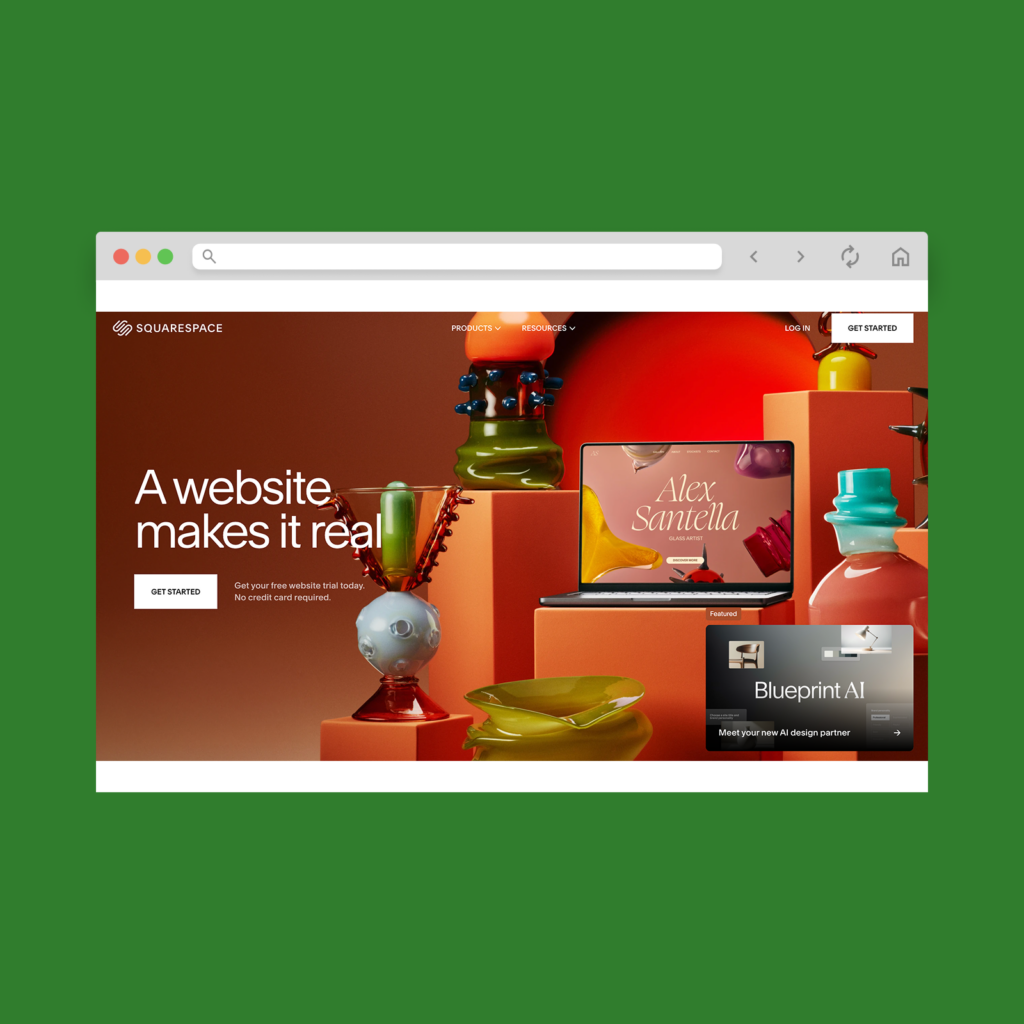
Squarespace is known for its sleek and modern templates, attracting many creatives and small business owners. It offers an all-in-one solution that combines website building, blogging, and eCommerce.
This premium website builder is ideal for those seeking a polished online presence with eCommerce options.
Key features:
- Professionally designed templates that look fantastic on mobile.
- Built-in blogging tools.
- eCommerce capability, including inventory management and product pages.
- SEO and marketing integrations.
- Custom domain and free secure sockets layer (SSL).
- Unique website personalization tools with drag-and-drop editing.
- Unified customer database for managing leads.
- 24/7 Customer support.
- Basic:$16/month
- Core: $23/month
- Plus:$39/month
- Advanced:$99/month
All prices shown above are the rates when paid annually. The Basic plan includes eCommerce tools but charges an online store transaction fee. The other plans offer more advanced eCommerce features without additional fees.
Pros:
- Visually appealing, customizable templates that adapt to whatever device you’re browsing on.
- All-in-one platform combining website building, hosting, and eCommerce.
- Fantastic blogging and portfolio features – ideal for content creators.
Cons:
- No free plan, and it’s more expensive than some competitors.
- Not super customizable without coding knowledge.
- Fewer integrations than Wix or Shopify.
Check our blog for an in-depth comparison of Wix vs Squarespace.
3. WordPress
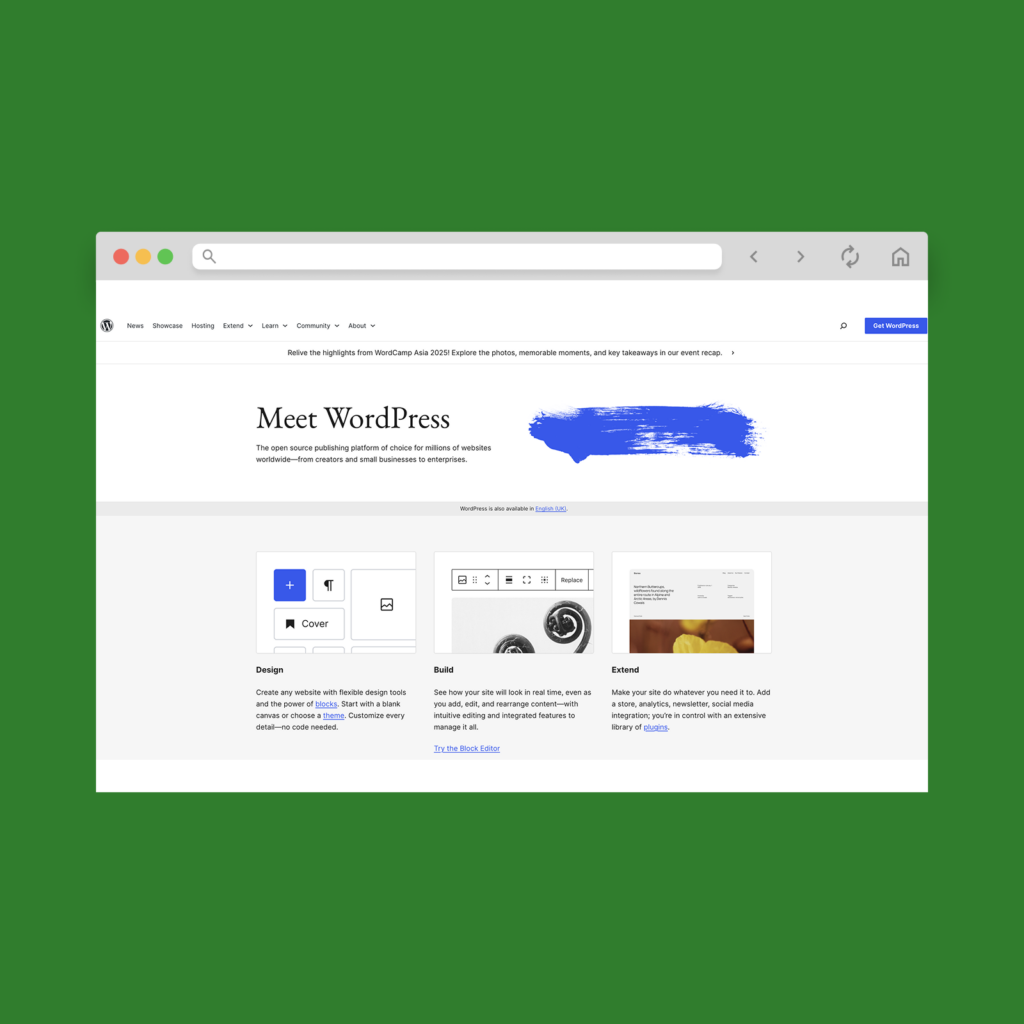
WordPress is a powerful, open-source content management system (CMS) that offers unparalleled customization and flexibility. It’s ideal for people who want complete control over their website’s design and features.
Many use it for blogs, business websites, and eCommerce stores (via the WooCommerce plugin), powering over 40% of the internet by 2021. If you need a robust website builder with tons of customization options, this is the alternative to Wix for you.
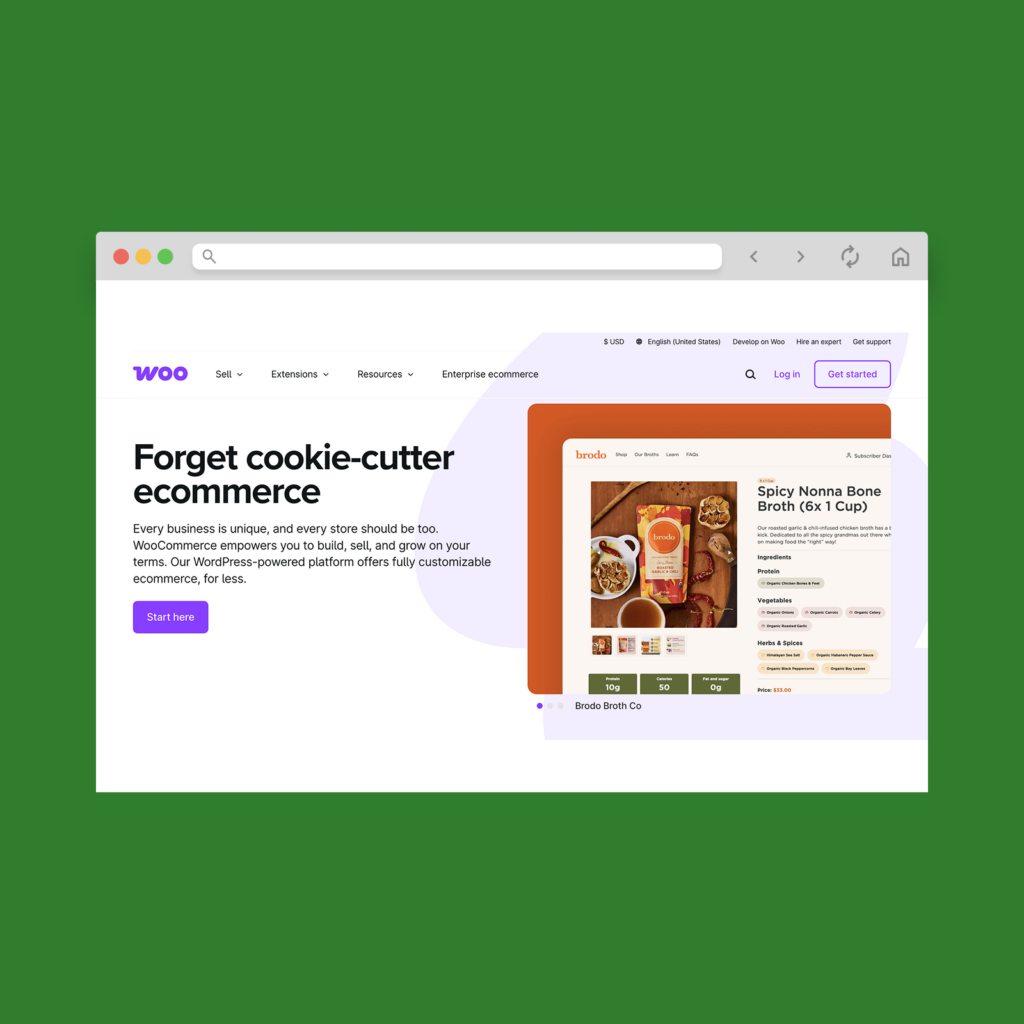
Pricing
- Software: Free
- Domain registration: Approximately $10-$15/year
- Hosting: Prices vary. Basic plans may also include domain registration, starting around $2.99/month with Hostinger. They can be higher based on the provider and services, and there may be considerable price increases after one year.
- Additional costs for premium themes, plugins, and developer assistance.
Key features
- Many themes and plug-ins.
- Built-in blogging and content management tools.
- SEO-friendly structure and plenty of SEO plug-ins.
- WooCommerce integration for running an online store.
- Fitsbusinesses of all sizes, from blogs and portfolios to eCommerce sites.
- Full control over website customization.
- Strong community support and regular updates.
Pros:
- Open-source with limitless customization possibilities.
- Large community with abundant resources.
- Suitable for any website type, including eCommerce (with the WooCommerce plugin).
- No platform restrictions.
- Great for blogging and SEO.
Cons:
- Users are responsible for site maintenance and security.
- Unlike Wix, it requires web hosting.
- Steep learning curve for beginners.
4. Webflow
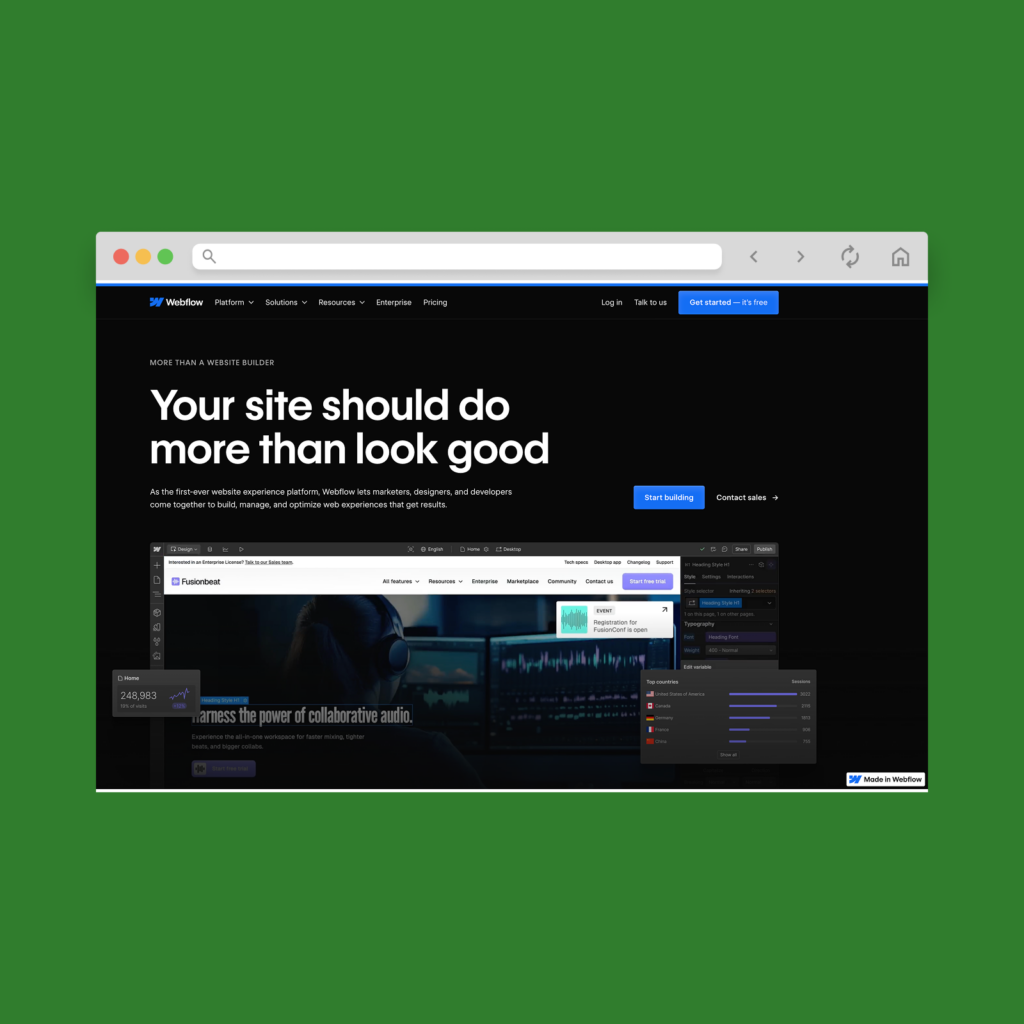
Webflow is a platform for building websites and managing content easily. It’s ideal for web designers and online store owners who need a flexible website with custom designs and advanced design features but don’t have deep coding knowledge.
Key features:
- Advanced design capabilities, drag-and-drop editing with HTML, CSS, JavaScript control, impressive animations, and dynamic styling tools.
- CMS capabilities for dynamic content.
- Hosting on fast, reliable servers and custom domains.
Site Plans:
- Basic:$14/month
- CMS:$23/month
- Business:$39/month
eCommerce Plans:
- Standard:$29/month
- Plus:$74/month
- Advanced:$212/month
All prices shown above are the rates when paid annually.
Pros:
- High level of design customization – best website builder for web designers.
- Built-in CMS.
- The visual interface eliminates the need for manual coding, but code can be added if wanted.
- Integrated hosting simplifies the website management process.
Cons:
- Steep learning curve, especially for non-designers.
- More expensive than some other builders.
- Pricier for small projects.
- No free plan for custom domains.
5. Weebly
![Weebly Wix alternatives Wix alternatives: The 9 best options for [bp_year] 1](https://printify.com/wp-content/uploads/2025/04/Weebly-Wix-alternatives-1024x1024.png)
Weebly is a visual online store builder owned by Square. It’s a great option for small businesses and people who want a simple yet functional website with built-in basic eCommerce tools.
It has intuitive drag-and-drop editing and is one of the best Wix alternatives for beginners.
Key features:
- Drag-and-drop functionality.
- Mobile-responsive templates.
- Built-in eCommerce function.
- App center.
- SEO tools.
- Integration with Square for payments.
- Square Photo Studio app for product photography.
- Custom domain support.
- Free plan with a Weebly-branded domain and eCommerce functionality.
- Free Plan
- Personal:$10/month
- Professional: $12/month
- Performance: $26/month
All prices shown above are the rates when paid annually.
Pros:
- Competitive pricing with a generous free plan that includes eCommerce tools.
- Very user-friendly.
- eCommerce integrations and built-in tools for setting up an online store.
- No technical skills or coding are needed to build an entire website.
Cons:
- Limited customization.
- With fewer advanced features than competitors, it may not suit growing businesses with complex needs.
- Very basic eCommerce tools.
6. GoDaddy website builder
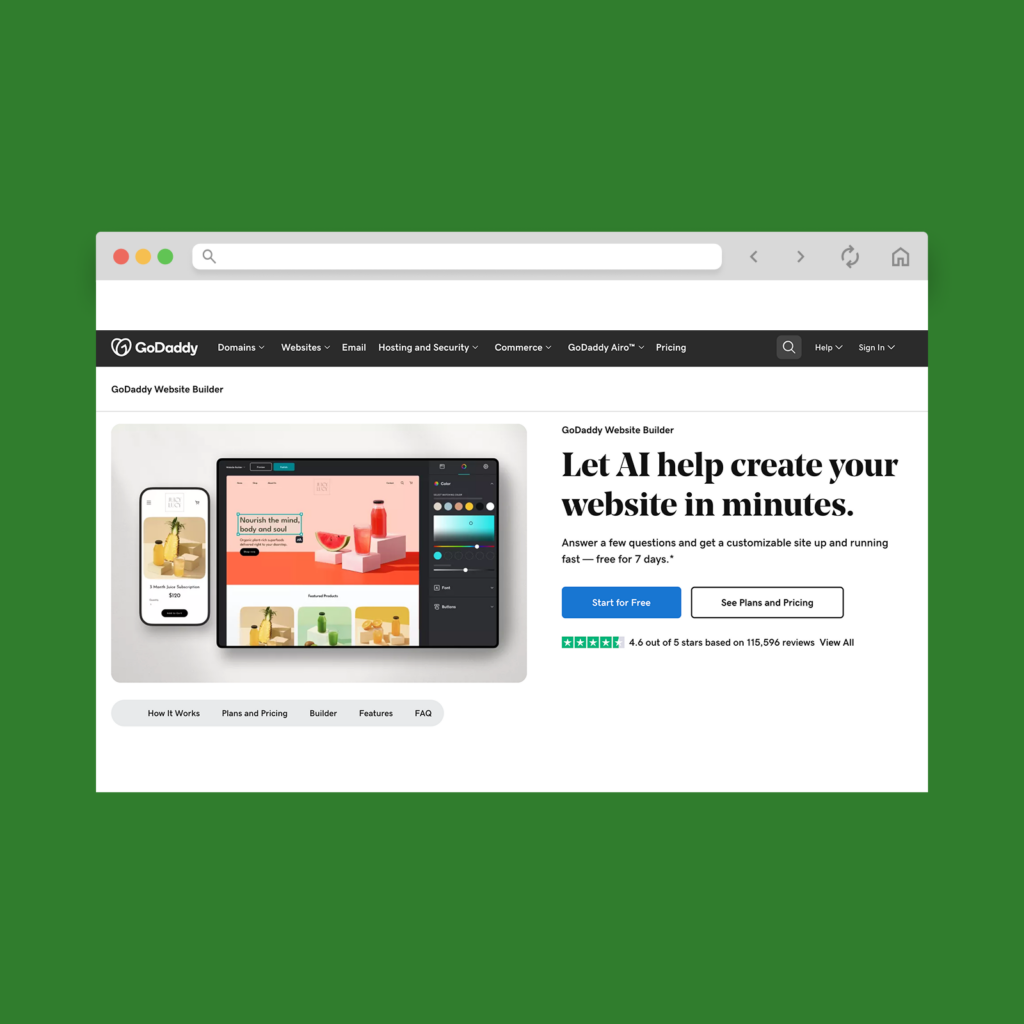
GoDaddy Website Builder is another all-in-one platform that lets users create professional websites without coding experience.
This alternative to Wix is great for small businesses and individuals seeking a quick and straightforward website setup that integrates website creation with marketing tools.
Key features:
- AI-powered design to help create personalized website pages quickly.
- Responsive, mobile-friendlytemplates.
- Integrated marketing tools, including email marketing, social media integration, and SEO tools.
- eCommerce capabilities, including online store setup with product listings, payment processing, and inventory management.
- 24/7 customer support.
- AI-powered design suggestions.
- Custom domain and hosting included.
- Affordable pricing with a free plan.
- Appointment scheduling.
- Basic:$9.99/month
- Premium:$14.99/month
- Commerce:$20.99/month
All prices shown above are the rates when paid annually.
Each plan includes SSL security, mobile-friendly site design, and 24/7 support.
Pros:
- Quick and easy setup and simple website creation process – ideal for beginners.
- All-in-one solution, combining website building with comprehensive marketing and eCommerce tools.
- Secure and dependable hosting services.
- One of the best Wix alternatives for basic sites.
- Affordable pricing plans.
Cons:
- Fewer customization options than competitors.
- Some features may require extra fees or higher-tier plans.
- Not as many advanced eCommerce tools as other websites like Wix.
7. Hostinger
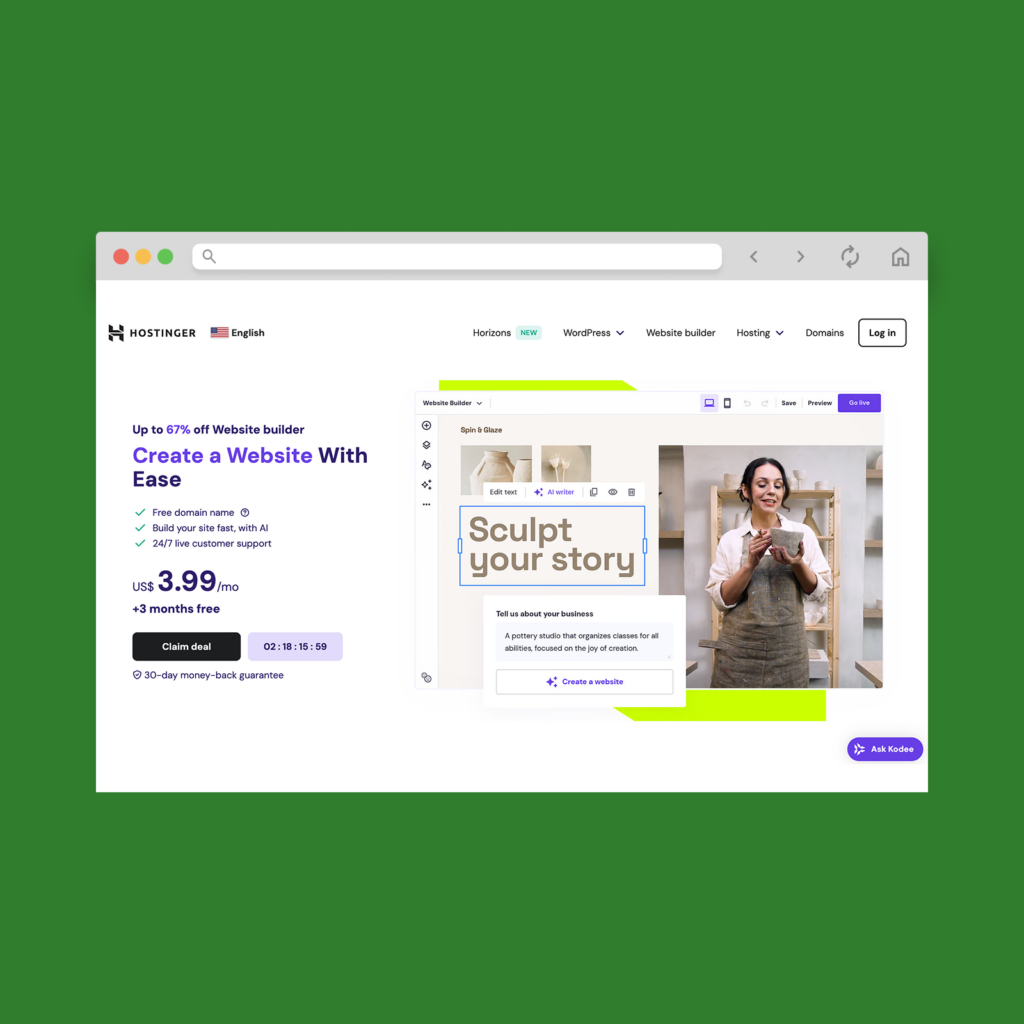
Hostinger is a powerful website builder for both beginners and experienced developers. It offers many tools for creating professional websites quickly and managing their performance efficiently.
The Hostinger website builder includes web hosting and a free domain. It’s ideal for budget-conscious users looking for a low-cost website builder with AI-powered tools, advanced features, and eCommerce capabilities.
Key features:
- AI-driven design and content generation tools with suggestions.
- Extensive library with over 150customizable templates optimized for many industries.
- eCommerce functionality supports online store setup with features like product management and payment gateways with no native transaction fees.
- SEO tools.
- Advanced features like heatmap analytics.
- Competitive pricing.
- Free SSL certificate.
- 24/7 customer support.
- Premium: $2.99/month for 48 months, then $7.99/month for 4 years
- Business: $5.99/month for 48 months, then $8.99/month for 4 years.
- Cloud Startup: $7.99/month for 48 months, then $19.99/month for 4 years.
Plans are paid annually. Both plans include a free domainonly for the first year, an SSL certificate, and access to all templates. The Business plan gives additional eCommerce options, and the Cloud Startup plan includes priority support and a dedicated IP address.
Pros:
- Competitive initial pricing with useful features suitable for different website types.
- User-friendly interface and intuitive design tools ideal for users of all skill levels.
- Offers web hosting with strong uptime and loading speeds.
Cons:
- Limited third-party integrations – not all external apps or plug-ins are supported.
- Some advanced resources may require time to master.
- Not ideal for complex websites.
- Less flexible for large eCommerce sites.
- Design customization options are somewhat basic.
- Steep price jump after the first term.
8. Webnode
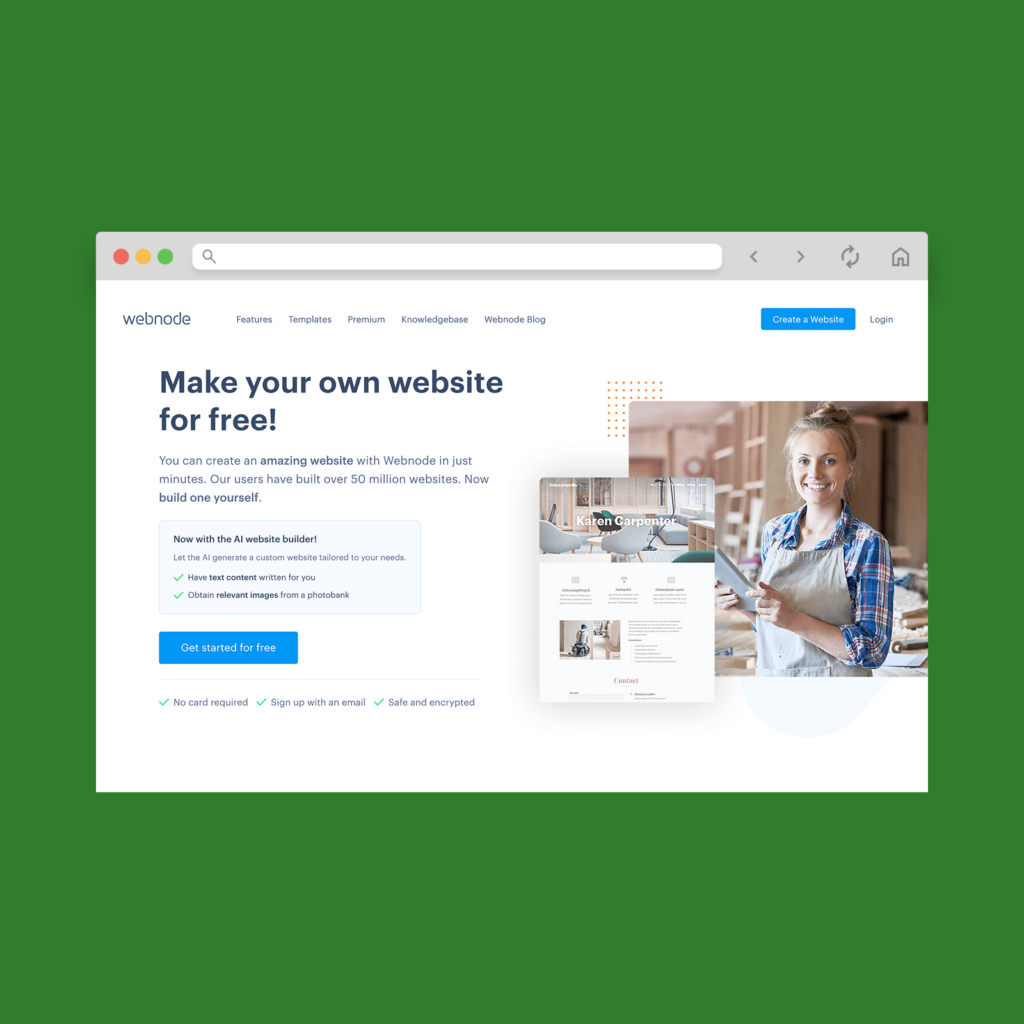
Webnode is a cloud-based website builder that lets users create websites with little effort. It targets individuals and small businesses looking for an easy-to-use website builder with essential features for establishing an online presence.
Key features:
- Includes a drag-and-drop editor, making designing websites without coding knowledge easy.
- Offers many modern, mobile-friendly, responsive templates tailored to different industries.
- The AI website builder generates personalized websites based on user inputs, simplifying the setup process.
- Supports eCommerce, including product management, payment processing, and order tracking.
- Lets users create sites in multiple languages for a global audience.
- Includes domain registration and professional email services to help small businesses establish a credible online presence.
- Limited: $4.50/month. No eCommerce or hosted domain.
- Mini: $8.50/month. No eCommerce
- Standard: $12.90/month
- Profi: $22.90/month
- Business: $31.90/month
Pros:
- The user-friendly interface makes it accessible to users with different skill levels.
- AI-driven tools and pre-designed templates let you develop your website quickly.
- Integrates website building, blogging, and eCommerce in one platform.
- Mobile editing lets you create and edit websites from smartphones or tablets.
- Free plan and competitively priced premium plans.
Cons:
- Limited customization options compared to several other Wix alternatives.
- You must upgrade to a higher-tier plan to access some advanced features.
- While templates are modern, they may not offer as much design flexibility as you need if you prefer highly customized webpages.
9. Duda

Duda is a professional website builder aimed at agencies and freelancers, offering robust tools for creating responsive and customizable websites.
Key features:
- Intuitive drag and drop builder.
- Facilitates teamwork and collaboration with client management and permissions.
- Responsive design on all devices.
- Allows for the creation of custom widgets to enhance functionality.
- eCommerce integration supports online stores with features like product management and payment processing.
- SEO management and marketing features like lead generation tools.
- Basic:$19/month
- Team:$29/month
- Agency:$52/month
- White label: $149/month
All prices shown above are the rates when paid annually. Each plan allows only one site.
Pros:
- Suitable for agencies and freelancers.
- Built-in tools for managing client projects.
- Advanced client management tools.
- Extensive customization options.
Cons:
- More expensive than other Wix alternatives.
- Fewer third-party integrations.
An overview of Wix alternatives
To sum everything up, fill out the following table:
| Platform | Pricing (starting at) | Ease of use | Design flexibility | eCommerce capabilities | Best use |
|---|---|---|---|---|---|
| Shopify | $29/month | Moderate | Limited | Excellent | Scalable online stores |
| Squarespace | $16/month | Easy | High | Good | Creative professionals & businesses |
| WordPress | Free (Hosting costs apply) | Challenging | Very high | Requires WooCommerce | Fully customizable sites |
| Webflow | $18/month | Moderate | Very high | Moderate | Advanced design control |
| Weebly | $6/month | Easy | Moderate | Basic | Small business owners |
| GoDaddy Website Builder | $10/month | Very easy | Low | Basic | Fast website setup |
| Hostinger Website Builder | $2.99/month | Easy | Moderate | Moderate | Affordable business sites |
| Webnode | $4.50/month | Easy | Easy | Basic | Budget-friendly small websites |
| Duda | $14/month | Moderate | High | Good | Agencies and businesses |
Still want to give Wix a try? Check out on our blogs how to create a Wix website and how to sell on Wix.
How to choose the right Wix alternative

The right platform for building your own website depends on your budget, technical skills, and goals.
- Budget-conscious users: If affordability is a priority, Hostinger Website Builder offers cost-effective plans with all the most essential features.
- Complete beginners: Weebly and GoDaddy Website Builder have user-friendly interfaces, making them great for those without experience.
- eCommerce: Shopify is the best choice for scalable online stores, while Squarespace offers sleek, professionally designed templates with built-in eCommerce tools.
- Content-focused sites and blogs: WordPress stands out for total customization, offering full control over your site’s design and functionality.
- Advanced design flexibility: Webflow is ideal for those seeking many styling features and greater control without extensive coding.
- Agencies and freelancers: Duda provides client management tools and white-labeling, making it a strong option for professionals managing multiple sites.
- Scalability: If you plan to grow your business, Shopify and Duda offer features that support long-term growth.
- Landing pages and portfolios: WordPress is the best option for quickly launching simple, one-page websites.
Check out these examples of Wix sites for inspiration.
Starting an eCommerce business? Sell with Printify

If you’re looking to sell custom products online, Printify is the way to do it. We integrate with many of these Wix alternatives, including Shopify, WordPress (WooCommerce), and Squarespace, for seamless listing and order fulfillment.
- Create a free account on Printify.
- Choose and design products with our beginner-friendly design tools.
- Decide where to sell – Connect to Wix, Shopify, Etsy, WooCommerce, Squarespace, and more.
- Focus on what matters – Let Printify handle fulfillment while you market and grow your business.
Get started with Printify today
FAQ
That depends on your needs. Platforms like Shopify (for eCommerce), Squarespace (for design-centric sites), or WordPress (for extensive customization) might be more suitable depending on your goals.
Squarespace, Weebly, and WordPress.com are the strongest Wix competitors, each offering very interesting features catering to different user preferences.
Wix’s pricing reflects its many valuable features, including a wide range of templates, apps, and customer support. However, there are free plans and more affordable alternatives available if you prefer a cheaper option.
Summary
Choosing the right website builder is a big part of having a successful online presence or eCommerce website. Take time to evaluate your budget, technical skills, website goals, and scalability, before deciding on a platform.
Whether it’s the design flexibility of Squarespace, the robust eCommerce capabilities of Shopify, or the customization potential of WordPress, there’s a great alternative to Wix for everyone.









